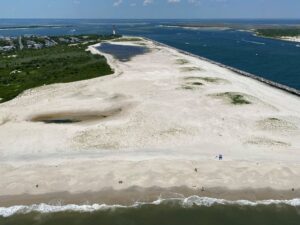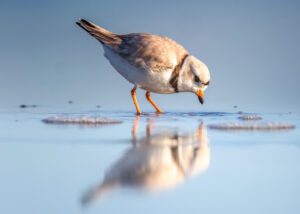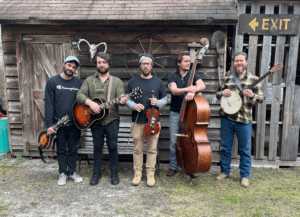The Friends of Barnegat Lighthouse State Park have announced the 2025 winter lecture series, which runs from January through April. All presentations take place at 1 p.m. at the park’s visitor information center and last about an hour. Admission is free. Series coordinator Carolyn Goeckel provided an overview of what to expect from each speaker and the topics each talk will encompass.
LIVING HISTORY: Civil War historian, professor, author and preservationist Anthony Waskie presents ‘The Life of Gen. George G. Meade.’ (Supplied Photos)
First up, on Saturday, Jan. 4 is Civil War historian, professor, author and preservationist Anthony Waskie presenting “The Life of General George G. Meade, Portrayed in a Living-History Performance.”
Waskie is a member of the Union League of Philadelphia, Executive Council of the Civil War History Consortium of Philadelphia and a co-founder and co-director of the Civil War and Emancipation Studies program at Temple University. He was a Pennsylvania Commonwealth Speaker-Scholar from 2006 to 2018. Among too many history-related organizations and institutions to mention, Waskie currently serves as president of the General Meade Society, board member of the Friends of Laurel Hill Cemetery, historian and board member of the Grand Army of the Republic Civil War Museum and Library, American Legion Post 405 at the Union League, Armed Services Council of the Union League, a founder and officer of the OV Catto Society, and archivist of the Dandy First Armory Museum at Drexel University Campus.

Originally from Bloomsburg, Pa., Waskie studied languages and history in college, earning his master’s and doctorate degrees at New York University. He has served as an army linguist, taught in many settings and received the Commendation Medal of the Pennsylvania Army National Guard.
Later in January, on the 18th, Linda Cook of the Friends of Southern Ocean County Animal Shelter will deliver a presentation on the Trap, Neuter, Release program to manage the feral cat populations humanely. Her talk will cover cat trapping, how it works, when and where to trap, and what to do after a cat is caught; spaying and neutering, vaccinations, ear tipping, microchipping and recovery; managing a feral colony, food and shelters; and kitten fostering and adoption.
“TNR is the most effective and humane way known to manage feral and stray cats and reduce their numbers,” according to Cook, a 
member of FOSOCAS for 15 years and current president, replacing founder Dottie Reynolds when Reynolds retired.
On Saturday, Feb. 8, FBLSP welcomes Todd Pover, senior wildlife biologist at Conserve Wildlife Foundation of New Jersey, to discuss Barnegat Light habitat restoration in a talk titled “Build It and Plovers Will Come.” Hear the story of habitat restoration to 
benefit piping plovers and other endangered shorebirds that nest on Barnegat Light beaches. Learn why plovers need a certain type of habitat to recover in New Jersey, and how they have fared at the site in the five years since its completion. Pover will also talk about Horseshoe Island, a nearby recently formed island that now hosts the highest concentration of colonial nesting beach birds in the state.
Pover, a Rutgers alumnus, has 30 years of experience in working with beach-nesting birds in New Jersey.
The following Saturday, Feb. 15, meet Amy Plantarich, communication and outreach coordinator at the Jacques Cousteau National Estuarine Research Reserve. She will present “Life on the Edge: Engaging All Ages in the Wonders of the Estuary.”
From triumphs to challenges, she will share her experiences engaging with audiences of all ages, her adventures at outdoor fairs and festivals, and reflections on her work with the “Life on the Edge” permanent, interactive exhibit at the Tuckerton Seaport.
Plantarich first connected with nature as a child by raising and releasing diamondback terrapins with the Wetlands Institute. She studied biology, theater and dance at Stockton University and has worked as an informal environmental educator across New Jersey. As communications and outreach coordinator at JCNERR, she creates engaging digital and print content, runs public outreach activities and manages the Seaport exhibit.

Three of these five guys will form an acoustic trio to present folk music history. (Supplied Photo)
Saturday, March 1, enjoy a live musical performance by an acoustic trio version of the band Jackson Pines – Joseph Makoviecki, James Black and Cranston Dean – as they present a history of traditional folk music from Burlington and Ocean counties. Get ready to hear “Clam Digger’s Blues” and “Mt. Holly Jail.” The band will draw a line between folk songs and musicians from the mid-1800s through the 20th century, to their original folk songs of today, such as “Hard Times in the Pines” and “Wheel,” while also talking about the history of Forked River folk pioneers Merce Ridgway and the Pine Hawkers.
The internationally touring folk band hails from Jackson. After appearances at the Philadelphia Folk Festival, in Montreal at the ACLA Conference, and at universities and libraries across the state, the band is excited to appear in Barnegat Light.
On Saturday, March 15, explore “Women Lighthouse Keepers and Attire of the Day” with historical costumer Liz Oliner, who will introduce the audience to Ellen S. Low, the first and only female keeper in Barnegat Light for a quarter of the year 1839. Low served as the principal Barnegat Lighthouse keeper after her son, who was the head keeper, died, according to the U.S. Coast Guard. Lighthouse keeper was one of the first and few non-clerical U.S. government positions offered to women.
“Often, women assumed these professional duties to assist their spouse or took over when they became ill and/or died,” the Coast Guard explains. “In a time when employment for women was extremely limited, these women were true trailblazers who served their country for many years with distinction.”
Oliner will also share the working attire these women wore in the 1800s.
On Saturday, April 12, learn about “The Amazing American Eel” with JCNERR’s Kaitlin Gannon, education coordinator.
Her program will review details about the biology, life cycle and ecological and commercial importance of the American eel (Anguilla rostrata). Learn, too, how JCNERR provides useful information about the American eel to fisheries managers, through community science with help from volunteers and students.
Gannon earned her degree in bio and life sciences from the University of Findlay. Her marine science education career started by working as a whale and dolphin naturalist in southern New Jersey. She then moved on to conducting outreach programming and on-board educational sea excursions for students with The Wetlands Institute. Today, Gannon conducts and coordinates education and environmental action programs for community members, grade school students and formal and informal educators. She is currently a graduate student in Rutgers’ learning, cognition and development program. Gannon’s special interests include engaging community members and students in real, authentic science experiences; addressing eco-anxiety in children and adults; and studying how exposure to climate change and natural disasters affect child development over time.
At the end of April, on Saturday the 26th, speaker Jon Fiorella will discuss the history of Tuskegee Airmen, the first African American military aviators in the U.S. Army Air Force. They trained at the Tuskegee Army Airfield in Alabama and flew both fighter and bomber planes. They flew more than 15,000 individual sorties during World War II in Africa and Europe, achieving one of the best records of all the escort fighter groups of the war.
The Tuskegee Airmen helped encourage the eventual integration of the U.S. armed forces, and many consider their efforts to be the cornerstone of the Civil Rights Movement that came later.
Fiorella lives in Carmel, N.Y. and has a vacation house in Barnegat. With more than a dozen publications to his credit, he is an award-winning science teacher and seasoned presenter at regional and national conferences, on science topics ranging from bioethics to aeroallergen research and history topics that cover the Civil War and WWII. Fiorella believes science is best learned through the lens of history.
In retirement, he continues to research and present at such venues as the New Jersey Maritime Museum, the West Point Museum, the Lincoln Depot Museum and Barnegat Lighthouse State Park. He also nurtures a creative side through wood burning and painting nautical scenes on driftwood, which he sells to benefit nonprofit organizations.
— Victoria Ford
This post was originally published on here







